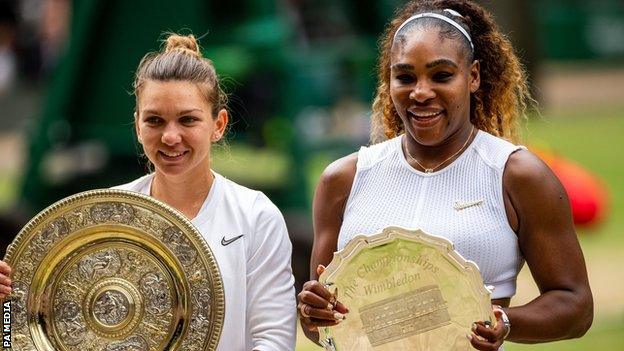Serena Williams says she is not overburdened by history after Wimbledon defeat
- Published

Seven-time champion Serena Williams lost in the Wimbledon final for the fourth time in her career
Serena Williams says she is not feeling overburdened by the weight of history despite missing another chance to win a record-equalling 24th Grand Slam title.
The 37-year-old American was outplayed by Romania's Simona Halep, who won her first Wimbledon title in a 6-2 6-2 win.
Defeat means Williams has now lost three Slam finals in the past year.
"Someone told me I shouldn't look at the records, I should just focus on my game. That's what I've been doing since I got to 18," she said.
Williams' last major title came at the 2017 Australian Open - when she was eight weeks pregnant - and moved her within one more of Margaret Court's all-time record.
Williams took a year off the tour as she gave birth to her daughter Olympia in September 2017, returning to the sport six months later.
She has lost to Germany's Angelique Kerber in last year's Wimbledon final and then Japan's Naomi Osaka in a controversial US Open final where an extraordinary outburst saw her call umpire Carlos Ramos a "thief" and a "liar".
This latest defeat - against an inspired Halep, who chased down everything Williams threw at her - came after a frustrating year in which she has been hampered by a knee injury.
"It seems like every Grand Slam final I'm in recently it has been an unbelievable effort to get there," she said.
"It would be interesting to see how it would be under different circumstances."
'She played out of her mind' - Williams gracious after Wimbledon final defeat
Williams is already the oldest woman to win a Grand Slam title - her victory in Melbourne two years ago coming aged 35 years and 125 days - and she does not think her age is a barrier to clinching that elusive 24th.
"I feel like I'm still incredibly competitive or else I wouldn't really be out here," she said.
"For the most part, I feel like I'm on the right track. I'm just going in the right direction in terms of getting back to where I need to be."
Two-time Grand Slam champion Tracy Austin suggested the weight of Williams matching Court's record might be "getting into her head".
"I just have to figure out a way to win a final," Williams said.
"Maybe playing other finals outside of Grand Slams would be really helpful just to get in the groove so by the time I get to a Grand Slam final I'm used to what to do and how to play."
Lack of match practice hampered Williams - Navratilova
Williams had only played five tournaments this year going into Wimbledon, pulling out of Miami and Rome because of a troublesome knee injury.
The seven-time Wimbledon singles champion breezed into the final here, dropping just two sets and spending little over eight hours on court.
But she came unstuck against Halep, whose athleticism enabled her to retrieve balls and keep Williams moving.
"That's where match play and fitness comes into play," Martina Navratilova, a nine-time Wimbledon singles champion and BBC Sport analyst, said.
"Serena was out of breath in the longer rallies and she couldn't catch up physically because she hadn't had to move as much before in her previous matches.
"That's why her timing was off because she had to move too much to the ball."
'She has stunned Centre Court' - Halep beats Williams in Wimbledon final
Williams says her knee "feels great" and plans to play events in Toronto and Cincinnati in the hard-court swing which culminates at the US Open in late August/early September.
"With a knee injury you're not able to do an exercise bike or extra running so she did look fatigued against Halep," fellow American Austin added.
"She's happy to be pain-free but I'd like to see her really commit for the next year and play enough tournaments to be match tough enough."
Austin's BBC colleague John McEnroe, a seven-time Grand Slam winner, added: "She has to get herself even fitter because at this level she can be exposed."
'She hasn't played enough quality opposition'
Williams had only won two matches against opponents ranked inside the world's top 50 this year coming into Wimbledon, including a memorable three-set victory over Halep - then ranked as the world's best player - at the Australian Open.
And, seeded 11th at Wimbledon, she reached the final without being tested by anyone of significant calibre.
Her highest-ranked opponent was Germany's world number 17 Julia Gorges, who she beat in straight sets.
"Serena hasn't played top-quality opposition and when she is a little bit off against quality opposition - which happened against Kerber, Osaka and now Halep - the ball is not coming as easy as it does against the other players," Navratilova added.
"Serena doesn't have a Plan B because normally she doesn't need it. She aces her way out of trouble, she powers through people.
"But nothing worked against Halep because the ball came back with interest and she wasn't used to seeing that. She didn't know what to do."
Austin added: "She was trying to draw from her past experiences, trying to hit harder, tried to hit closer to the lines and by the end when she was a set and 4-2 down she looked like she had nothing left to give.
"She had lost her spirit."